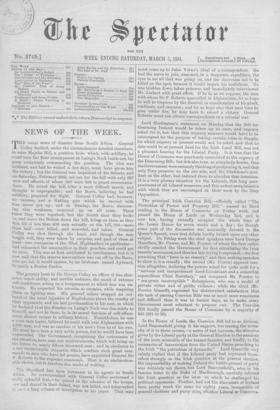The principal Irish Coercion Bill,—officially called "The Protection of Person
and Property Bill,"—passed its third reading in the House of Commons on Friday week, and passed the House of Lords on Wednesday last, and is now law, having virtually occupied the whole time of the Lower House for seven weeks and a day ; for though some part of the discussion was nominally devoted to the Queen's Speech, even that debate hardly turned upon any other subject. On Friday week the chief speakers were Lord George Hamilton, Mr. Cowen, and Mr. Forster, of whom the first rather shrilly assailed the Government for first stimulating the Irish tenants' movement, and then too late trying to repress it,—for first preaching that "force is no remedy," and then making speeches to show it is a remedy ; the second (Mr. Cowen) opposed coer- cion altogether, declaring the powers asked for quite unfit for a "nervous and inexperienced Lord-Lieutenant and a somewhat supercilious Chief Secretary," and compared Mr. Forster to " sea-green incorruptible" Robespierre, who was a model of private virtue and of public violence ; while the third (Mr. Forster himself), expressed his disinterested satisfaction that the task of passing Coercion Bills was so much more wearisome and difficult than it was in former days, as to make every Government most reluctant to propose one. The Coercion Bill finally passed the House of Commons by a majority of 245 (281 to 36).


































